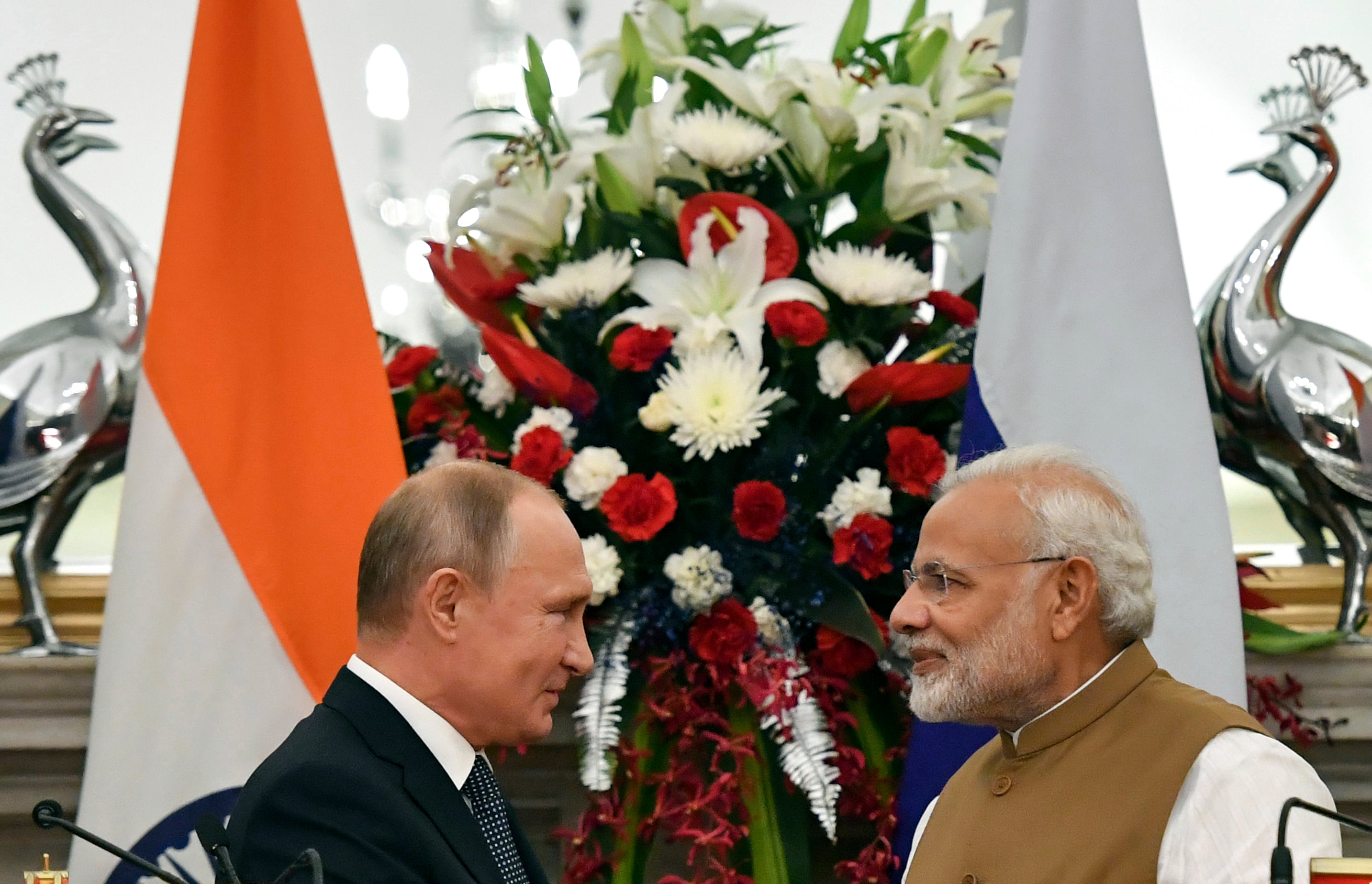WASHINGTON ― Eyeing China, U.S. and India committed to deeper defense ties in space and cyberspace as well as an expansion of their joint military exercises, officials from both countries announced Monday.
Defense Secretary Lloyd Austin and U.S. Secretary of State Antony Blinken met in Washington with their Indian counterparts — Defense Minister Rajnath Singh and External Affairs Minister Subrahmanyam Jaishankar — amid rising tensions between the allies over India’s muted criticism of Russia’s invasion of Ukraine.
U.S. President Joe Biden spoke with Indian Prime Minister Narendra Modi virtually before the “two-plus-two meeting” about managing climate change, fighting COVID-19 and mitigating economic shocks from the invasion of Ukraine. Afterward, Indian officials emphasized their call for an end to the war and New Delhi’s provision of humanitarian aid in the conflict.
Few details on the defense agreements were released immediately, but Austin said the U.S. signed an agreement with India on space situational awareness and exchanges between U.S. Space Command and India’s Defense Space Agency ― and to deepen cyberspace cooperation through training and exercises later this year.
Financing options to make U.S. weaponry more affordable, to wean India from its reliance on Russian military equipment, are part of ongoing discussions, Austin said. He also said the nations agreed to unspecified “supply chain cooperation measures that will let us swiftly support each others’ priorities in defense requirements.”
“India continues to acquire key U.S. defense platforms, and that is forging important and new ties between our defense-industrial bases,” Austin said. “We’re doing all this because the United States supports India as a defense industry leader in the Indo-Pacific and a net provider of security in the region.
“The People’s Republic of China is seeking to refashion the region and the international system more broadly, in ways that serve its interest and so I’m pleased that we’ve identified new opportunities to extend operational reach of our militaries, and to coordinate more closely across the expanse of the Indo-Pacific,” he added.
RELATED

Austin said the two sides agreed Monday to “expand the scope and complexity” of Tiger Triumph, a joint tri-service exercise between the two countries. Though the U.S. is India’s largest defense exercise partner, the two have only conducted Tiger Triumph once, in 2019.
The two democracies have a growing security partnership, founded on countering China’s influence, but India’s long-standing ties to Russia have complicated the relationship, especially since Russia invaded Ukraine earlier this year. Both Blinken and Austin emphasized Washington’s goal of deepening bilateral ties on security and beyond and didn’t criticize New Delhi at their joint press conference.
“India’s relationship with Russia has developed over decades, at a time when the United States was not able to be a partner to India. Times have changed,” Blinken said. “Today we are able and willing to be a partner of choice with India across virtually every realm: commerce, technology, education and security.”
When it came to questions about India’s ties to Russia on energy or defense equipment, Jaishankar said the ongoing defense collaboration with the U.S. wasn’t always available.
“We are standing here for a two-plus-two with substantial defense collaboration, which has happened in the last decade, which we have been discussing how to take forward ― and that wasn’t an option for about 20 years before,” Jaishankar said. “The world is changing; the world will keep changing. What we have to do now is to watch it and see how our interests are best advanced.”
Amid the tensions over Ukraine, Washington must decide whether it wants to risk a promising relationship to counter China in exchange for short-term gains against Russia, said Richard Rossow, an India scholar at the Center for Strategic and International Studies.
Severing its ties with Russia isn’t so simple, Rossow said. As it clashes with China along their disputed border, India can’t afford to alienate Russia, which supplies a large share of its weaponry, including many of its tanks, aircraft, submarines ― and its only operational aircraft carrier.
“India’s military preparedness almost completely relies on Russian equipment and spares. If Russia were to withhold the export of military equipment to India, how quickly would India’s military readiness erode? Pretty quick,” he said. “With all this Russian equipment, they don’t have the resources to abandon it and bring something else on.”
RELATED

America’s defense trade with India rose from near zero in 2008 to $20 billion in 2020, while Russia’s share of India’s defense trade has shrunk from 90% some 25 years ago to 60% more recently, Rossow said. U.S. officials have said that in the wake of western sanctions against Russia and its defense industry, it will be hard for India to get spare parts.
India last week said it would ramp up domestic production of military equipment to offset potential shortfalls from Russia, and it’s proposing barter trade instruments for supplies of weapons and spares with Russian defense authorities, an Indian official said last week.
As the U.S. strengthens its ties to India, the Biden administration has delayed enforcement of a 2017 law ordering sanctions on any country trading with Russia’s defense and intelligence sectors. The sanctions would apply to India’s 2018 purchase of Russia’s S-400 Triumf air defense system, which was expected to be installed next month.
“The clock is ticking on when the United States is going to have to make a determination on applying sanctions. If we choose not to, we have to thread the needle to claim India would qualify under pretty narrow waiver provisions,” Rossow said.
No resolution was announced after Monday’s meetings.
“We continue to urge all countries to avoid major new transactions for Russian weapons systems, particularly in light of what Russia is doing to Ukraine,” Blinken said. “We have not yet made a determination regarding potential sanctions or potential waivers.”
Joe Gould was the senior Pentagon reporter for Defense News, covering the intersection of national security policy, politics and the defense industry. He had previously served as Congress reporter.







